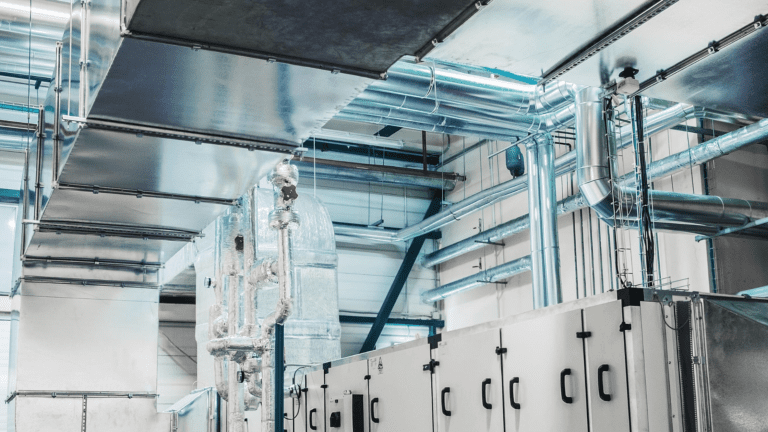 When it comes down to mechanics, a commercial air conditioning system is similar to the kind used by consumers at home. Although the commercial air conditioning system is much larger and more resource-intensive, the fact remains that its basic parts are the same.
When it comes down to mechanics, a commercial air conditioning system is similar to the kind used by consumers at home. Although the commercial air conditioning system is much larger and more resource-intensive, the fact remains that its basic parts are the same.
It’s no news to anyone experienced with a commercial HVAC system that the principal component is the compressor unit. The compressor, say a Carrier model 06ET275360, is the “heart” of the system. Its purpose is to pressurize refrigerant to raise its temperature. As the refrigerant is compressed, the temperature goes up.
The biggest problem you can have within your commercial air conditioning system is a compressor issue. If the compressor fails, it may require replacement. There may be other faults across the system that need to be addressed before a new compressor will work effectively.
But does a compressor failure mean you need to replace the entire system?
In general, the answer is no – but there are a few caveats.
After Compressor Failure, Check the Entire System from Top to Bottom
A compressor becomes less efficient with age and requires more proactive maintenance than it did in earlier years. It must be watched carefully starting around the eighth year of service and plans made for its eventual replacement – usually around year ten, though some units last longer.
If a compressor fails, there are two different matters to be concerned about:
- Problems with other components in the air conditioner may have contributed to the failure
- The failure condition itself may have damaged other components within the AC system
Remember that there are four other major components in the air conditioning, including the refrigerant. An electrical or mechanical problem that affects the condenser coil, expansion valve, or evaporator coil can cause pressure on the compressor unit that leads to early failure.
If your compressor has been operating normally and fails “out of the blue,” it’s a good idea to have HVAC professionals examine the entire system. Root cause analysis is crucial to ensure you don’t install another compressor only to have it succumb to the same woes in short order.
You May Need to Replace the Entire System Under Certain Circumstances
In general, compressor failure does not mean your entire commercial air conditioning system needs to be scrapped. At the very least, you will still have the use of your building’s vents and ductwork. However, there are some types of compressor failure that can cause system-wide complications.
One of these is refrigerant slugging. Slugging refers to unwanted moisture infiltration into the compressor cylinder. While refrigerant slugging is the most common example, slugging can also be caused when there are humid exterior conditions, or by a liquid spill of some type that affects the AC system.
Slugging is notorious for causing compressor damage quickly and is often not covered under a standard factory warranty.
Not only can slugging take an otherwise healthy unit offline fast, it leads to mechanical damage that can affect your condenser and evaporator coils. On top of all that, you may lose the refrigerant that was in the system at the time. In such a worst case scenario, your AC system may be essentially wiped out.
A New Compressor Will Usually Get Your Commercial AC Up and Running Fast
Luckily, the worst case scenario is just that – worst. And it is relatively rare.
In most cases, should your compressor fail, you will be able to get back up and running quickly once you have a replacment compressor to install. Ideally, the compressor should be the same model as the one that failed but if that is not a possibility, the relacement compressor needs to have a size and operating capacity suitable to manage your load
Most times, it is not a question of whether the system will work, but how to get it working fast.
Needless to say, you’ll be facing complaints quickly once a commercial air conditioning system goes down. In some environments, such as offices, there are significant productivity consequences of uncomfortable temperatures. More rarely, they can even contribute to health issues.
Under these circumstances, an all-new OEM compressor unit could be a bad bet.
New compressor units may take weeks to deliver and often come at a significant premium. The wholesalers who are associated with OEM manufacturers trade on their brand names to sell units at inflated rates.
A remanufactured commercial compressor is the solution.
A completely remanufactured commercial compressor offers performance equal to any all-new unit at a far lower price: Often 30% or 40% less. Plus, you have the opportunity for delivery and installation much sooner, saving you several days or even weeks of uncomfortable temperatures.
An experienced technician can also help you execute on a complete maintenance plan so that the cause of your previous compressor’s failure can be identified and prevented in the future. All in all, your preventive maintenance plan could save you tens of thousands of dollars over the years!












